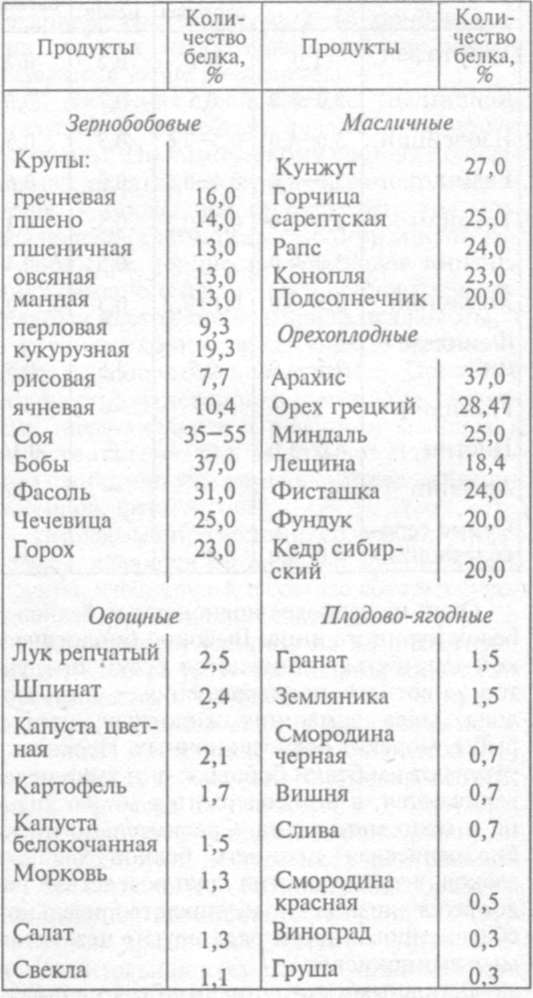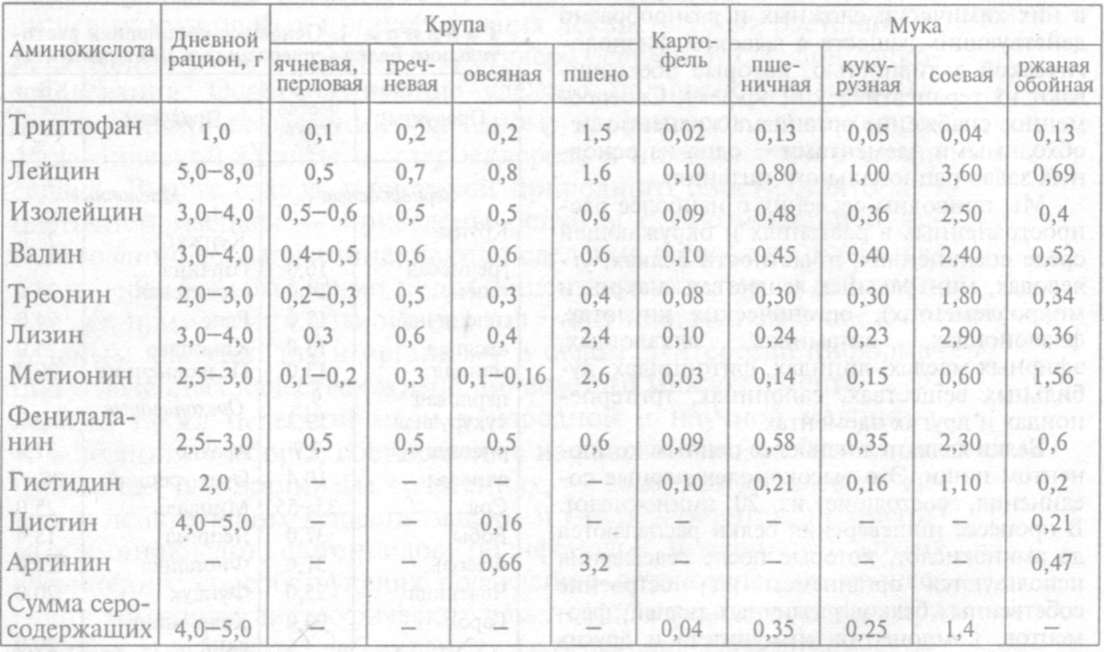Proteins are the most valuable component of food.
Proteins are the most valuable component of food. These are high molecular compounds, consisting of 20 amino acids. In the process of digestion, proteins break down to amino acids, which after absorption are used by the body to build their own proteins of various tissues, enzymes, immunity components and other biologically active compounds.
Most amino acids can be synthesized again in the body, however, 8 amino acids necessary for the construction of their own proteins, the adult should receive valine, leucine, isoleucine, lysine, methionine, threonine, tryptophan and phenylalanine with food from plant and animal products. For infants, histidine is also an essential amino acid.
The total amount of protein and the content of individual amino acids in different foods are not the same. So in soy contains 35-55% protein, in lentils - 25, in peas and beans - 22-31, in most cheeses -23-26, in different types of meat, poultry and fish - 15-21, in walnuts - 15 , 6-28,47, almonds and hazelnuts, respectively, 25 and 20, in cereals (buckwheat, oats, semolina and wheat) - 13-16, pearl barley - 9.3, rice - 7.7, in wheat bread - about 8 , 5, rye - 5-6% (see the table).

Most vegetables, fruits, mushrooms, berries contain no more than 2% of proteins. It is important not only the total protein content, but also their qualitative composition. The completeness of using protein from foods and ready meals or the biological value of the latter primarily depends on the degree of digestion in the digestive tract and the balance of the essential amino acids that make up their composition. At a deficiency of even one indispensable amino acid, specific disorders of the vital activity of the organism are observed. The closer to the composition of amino acids used in food protein to the composition of body proteins, the higher its biological value, the less it is required to meet the needs of the organism (see Table).

One of the most complete proteins is the egg white protein. High in biological value are proteins of products of animal origin - eggs, milk, meat of domestic animals, poultry, fish, marine invertebrates. The proteins of legumes are somewhat inferior to them: they are digested worse, they contain a lot of lysine and little methionine. The biological value of protein from cereals and also of many cereals is comparatively low due to lack of lysine and unsatisfactory balance of a number of other essential amino acids.
The main sources of protein in the daily diet of many people are various meat, fish, dairy, cereals and legumes. Therefore, when compiling a rational menu, you need to select the protein composition of dishes so that the result is a biologically useful food for each meal, since the proteins of different products are better mutually complement each other when they are used at the same time. So, if you wash buckwheat friable milk porridge, then the biological value of the proteins consumed in this case will be much higher than if the same products are not eaten immediately, but at different times.
The high biological value is enjoyed by dishes and culinary products, consisting of products of animal and vegetable origin - flour products with cottage cheese, meat and fish dishes with vegetable and cereal side dishes.
It is proved that the use of animal and vegetable protein is higher the more foods are included in the dish. The digestibility of fish proteins (cod or hake), baked together with potatoes and omelet (egg-milk mixture), is on average 16-19% higher than proteins of boiled fish. However, this does not mean that if you exclude from the diet products of animal origin, protein nutrition will always be inadequate.
Using a certain ratio of plant products, you can improve the content of essential amino acids in food. Mutual enrichment of the amino acid composition occurs when the beans are combined with cereals and vegetables.
The need for a protein varies from person to person. It depends on the age, sex, lifestyle, the nature of work, living conditions, seasonal and climatic factors, the intensity of metabolic processes and other reasons that require an individual approach. On average, the daily protein norm for an adult young person is 1.3 g per 1 kg of body weight, i.e., about 90 g per day, provided that the diet is fat and carbohydrate. It is desirable that the protein is on average 11-13% of the total caloric intake. For residents of the Far North, the proportion of protein in food should be higher than for people living in temperate climates or in the subtropics.
With a constant lack of protein in the diet and its quality inferiority, metabolism is disrupted, working capacity is reduced, the body is resistant to infectious diseases and other harmful environmental factors.
Prolonged protein starvation in children causes a delay in growth, a slowdown in mental development. Excessive use of proteins, especially animals, is also undesirable. In this process, the processes of putrefaction in the intestine with the formation of toxic substances are intensified, appetite worsens, the functions of the nervous system, liver, and kidneys are disrupted. Small children and elderly people are especially sensitive to excess protein.
The presence of predominantly high protein foods in children stimulates premature development, promotes obesity, and negatively affects mental activity. In the elderly, a large number of meat foods, containing along with proteins, many nucleic acids (meat of young animals, game, liver, kidneys), increases the risk of diseases of gout and kidney stone disease. Negative effects on the health of excessive consumption of sausage, ham and other foods high in animal fats. Thus, an excessive amount of high-protein food does not work.
The assimilation of protein food is greatly influenced by the methods of preparation and methods of heat treatment. Proteins of most products after cooking are more easily and more fully processed by digestive enzymes and are better absorbed. With prolonged heat treatment (stewing) or frying over an open fire at temperatures above 200 ° C, the biological value of proteins decreases. In addition, the decay products of certain amino acids are also harmful.


Comments
When commenting on, remember that the content and tone of your message can hurt the feelings of real people, show respect and tolerance to your interlocutors even if you do not share their opinion, your behavior in the conditions of freedom of expression and anonymity provided by the Internet, changes Not only virtual, but also the real world. All comments are hidden from the index, spam is controlled.